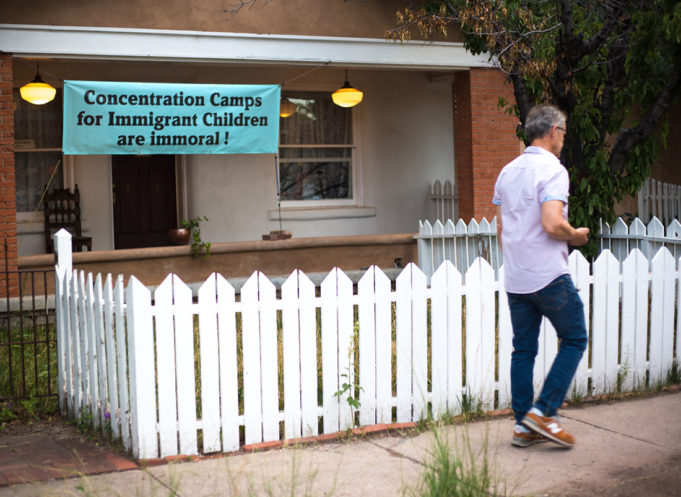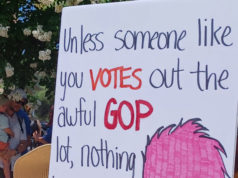Roughly 2,000 minors are held in border facilities on any given day. The U.S. Department of Health and Human Services is charged with their care. We’ve all seen the photos of cages packed with little kids, many without mats, sleeping on cement floors with nothing but space blankets to keep them warm. Certainly not all of the border facilities — which are supposed to move those kids out to family, friends, or shelters within 72 hours and must, by law, move them out in five days, tops — are that bad. But many are, and investigators and whistleblowers have talked continually about the inhumane conditions in which those kids are kept.
Many of the minors are separated from their parents or other relatives when those adults are arrested, leaving the unaccompanied minors at our border. A humane government would try its level best to make the facilities holding them good way stations until they move on. The Trump administration chooses not to do that. And it’s gone to court repeatedly to fight for the right to treat those children badly.
Fortunately, the courts have thus far disagreed with the government.
Most recently, on August 15, over the objections of the Trump administration, a three-judge panel of the United States Court of Appeals for the Ninth Circuit (San Francisco) ordered the administration to begin supplying adequate food, basic hygiene necessities (toothbrushes, toilet paper, showers, soap), and improve conditions for sleep for children and teens held at border facilities.
The panel dismissed an appeal of a 2017 district court decision that said the United States was bound by an earlier court case involving the “safe and sanitary” treatment of children and teens who had crossed into the United States from Mexico either illegally or while seeking asylum. This earlier case was a lawsuit brought on behalf of minors held by immigration authorities in 1985. The lawsuit was finally brought to a close in 1997 after an agreement between the parties was negotiated. That agreement is known as the Flores Agreement, and it resulted in the United States setting nationwide standards for the detention, treatment, and release of minors held by the Immigration and Naturalization Service, now known as U.S Citizenship and Immigration Services. Those standards require all agencies holding immigrant minors in their custody, regardless of the minors’ legal status, to keep them “in facilities that are safe and sanitary.” The agreement also requires that minors be “treated with dignity, respect, and special concern for their particular vulnerability as minors.”
The United States –– led by Attorney General William Barr, Acting Secretary of Homeland Security Kevin K. McAleenan, the U.S. Department of Homeland Security, U.S. Immigration and Customs Enforcement, and U.S. Customs and Border Protection – challenged the 2017 district court ruling that found the government was violating the Flores Agreement by keeping minors in unsafe and unsanitary conditions. The court held that “sanitary” specifically meant that those kids should receive toothbrushes, soap, towels, and showers and that “safe” included not overcrowding them, not having them sleep on cement floors, and feeding them edible food.
Yes, it’s hard to imagine that any administration would object to being blocked from serving expired or rotten food to children and not providing diapers to the youngest kids, but that is exactly what Trump’s White House did when they not only brought the original case but then appealed the ruling.
In writing for the panel dismissing the government appeal, Judge Marsha S. Berzon said, “Assuring that children eat enough edible food, drink clean water, are housed in hygienic facilities with sanitary bathrooms, have soap and toothpaste, and are not sleep-deprived are without doubt essential to the children’s safety.”
Berzon went on to note that in the 2017 district court decision, the court found that “although the agreement makes no mention of the words ‘soap,’ ‘towels,’ ‘showers,’ ‘dry clothing,’ or ‘tooth brushes’ … these hygiene products fall under the rubric of the agreement’s language requiring ‘safe and sanitary’ conditions.”
Berzon continued: “The district court also determined that although the word ‘sleep’ does not appear in the agreement … citing evidence that many minors in Border Patrol custody are forced to sleep on concrete floors, with no bedding aside from pieces of thin polyester foil, and are subjected to cold temperatures, serious overcrowding, and constant lighting, the district court found that the government was violating the agreement at certain Border Patrol stations by holding children in facilities that deprived them of adequate sleep.”
Bethany Carson, immigration policy researcher and organizer for Grassroots Leadership, a nonprofit trying to eliminate all private for-profit prison firms nationally, said, “Part of what is happening is that private companies are running these places, and they use private services from commissary to medical staff to other necessary people. And all of them have a hand out for a piece of the pie.”
That piece of the pie used to be about $700 per night per minor at the notorious tent city in Tornillo, Texas, run by BFCS, an international nonprofit that is not currently involved in any of the border facilities, a spokesperson for the organization told us.
The Department of Health and Human Services also did not return calls requesting the names of any private contractors involved in the border facilities for minors and, if so, what prices were being paid.
It is a reasonable question because toothbrushes simply do not cost very much, and if a company were receiving $700 per child per night, you would think they would be housed in a motel suite with a full-time adult guardian seeing to their needs.
“The majority of these kids have somewhere to go,” Carson said. “When they don’t, there are humane shelters for them. Unfortunately, what is happening is happening for political purposes. It is an attempt to generate fear against immigrants and to feed the administration’s base and to use this situation to create more and more repressive policies.”
The United States government has not announced whether they will mount another appeal to try to keep those minors from decent food and a bit of soap.












